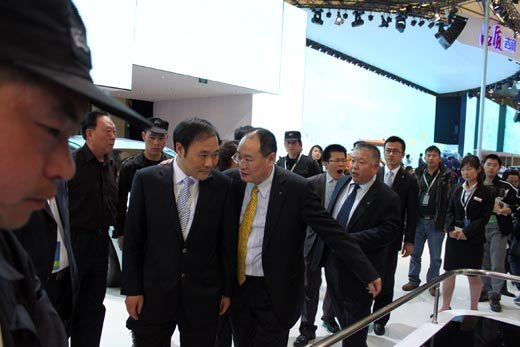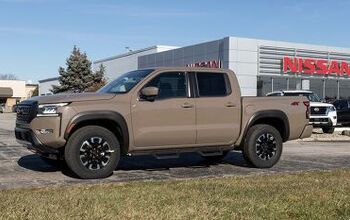Geely Down, GM Up. And Why Favoring Foreigners Is Good For The Chinese Government

We have been pointing it out for quite a while: Something counter-intuitive (and counter- conventional wisdom) is happening in China: While the growth of the general market is slowing down, it is at the expense of the Chinese brands. The foreigners are doing fine.
Nothing illustrates this better than the story of the two Gs, Geely and GM. In October, the growth of the Chinese market effectively came to a halt.
How did the two Gs fare during that braking maneuver?
- Geely’s Chinese car sales fell 10.3 percent in October, compared to October 2010, Reuters reports. In the first 10 months of 2011, Geely sold 329,110 vehicles, up 4.5 percent from a year earlier.
- In the same October, GM China’s sales were up 10.4 percent. During October, 2011 sales by GM in China surpassed 2 million, reaching 2,113,274 units . GM China’s Kevin Wale expects an increase of 10 percent by the end of the year.
The two Gs reflect a trend that has been evolving for a while in China: The foreign joint venture brands are getting stronger, the homegrown brands are losing share. The share of homegrown brands stands at an all-time low of 29 percent for the first 10 months of the year. The Chinese government has acknowledged that fact and is exhorting its manufacturers to speed up development in order to catch up with foreign brands and technology.
The Chinese government however is in a very interesting position: The joint ventures with foreigners are mostly in the hands of state owned enterprises. The homegrown brands are more in the hands of the independents. When it comes down to brass tacks, the Chinese government will favor its own enterprises, and oddly enough, that means favoring foreigners over pure Chinese brands.
PS: One thing should be kept in mind when comparing percentage numbers and when announcing the end of Chinese growth. We are now comparing with a last quarter of 2010 which was on an absolute tear. The Chinese market had been up 27 percent in October 2010. In the same month, GM China had been up 20 percent.

Bertel Schmitt comes back to journalism after taking a 35 year break in advertising and marketing. He ran and owned advertising agencies in Duesseldorf, Germany, and New York City. Volkswagen A.G. was Bertel's most important corporate account. Schmitt's advertising and marketing career touched many corners of the industry with a special focus on automotive products and services. Since 2004, he lives in Japan and China with his wife <a href="http://www.tomokoandbertel.com"> Tomoko </a>. Bertel Schmitt is a founding board member of the <a href="http://www.offshoresuperseries.com"> Offshore Super Series </a>, an American offshore powerboat racing organization. He is co-owner of the racing team Typhoon.
More by Bertel Schmitt
Latest Car Reviews
Read moreLatest Product Reviews
Read moreRecent Comments
- Peter Buying an EV from Toyota is like buying a Bible from Donald Trump. Don’t be surprised if some very important parts are left out.
- Sheila I have a 2016 Kia Sorento that just threw a rod out of the engine case. Filed a claim for new engine and was denied…..due to a loop hole that was included in the Class Action Engine Settlement so Hyundai and Kia would be able to deny a large percentage of cars with prematurely failed engines. It’s called the KSDS Improvement Campaign. Ever hear of such a thing? It’s not even a Recall, although they know these engines are very dangerous. As unknowing consumers load themselves and kids in them everyday. Are their any new Class Action Lawsuits that anyone knows of?
- Alan Well, it will take 30 years to fix Nissan up after the Renault Alliance reduced Nissan to a paltry mess.I think Nissan will eventually improve.
- Alan This will be overpriced for what it offers.I think the "Western" auto manufacturers rip off the consumer with the Thai and Chinese made vehicles.A Chinese made Model 3 in Australia is over $70k AUD(for 1995 $45k USD) which is far more expensive than a similar Chinesium EV of equal or better quality and loaded with goodies.Chinese pickups are $20k to $30k cheaper than Thai built pickups from Ford and the Japanese brands. Who's ripping who off?
- Alan Years ago Jack Baruth held a "competition" for a piece from the B&B on the oddest pickup story (or something like that). I think 5 people were awarded the prizes.I never received mine, something about being in Australia. If TTAC is global how do you offer prizes to those overseas or are we omitted on the sly from competing?In the end I lost significant respect for Baruth.


































Comments
Join the conversation
My guess is that the Chinese government, for reasons of both infrastructure and social control, is not ready to put 1.5 billion people on wheels. Discouraging the sale of inexpensive cars that are far lower in crash, emissions, and quality standards of areas like Japan and North America is a useful indirect way to do that.